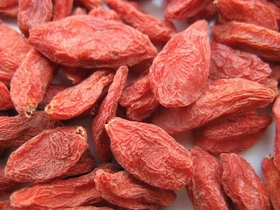 romising research on goji berry (Lycium barbarum) has shown a positive correlation between consumption of the fruit and neuroprotective benefits that minimize the ravaging effects of Alzheimer's. These findings give a ray of hope to the over 4.5 million Americans who suffer from the disease. A staple in traditional Chinese medicine (TCM), goji is an exceptional superfood that safeguards the health of both body and mind.
romising research on goji berry (Lycium barbarum) has shown a positive correlation between consumption of the fruit and neuroprotective benefits that minimize the ravaging effects of Alzheimer's. These findings give a ray of hope to the over 4.5 million Americans who suffer from the disease. A staple in traditional Chinese medicine (TCM), goji is an exceptional superfood that safeguards the health of both body and mind.Not your average berry
Packed with important nutrients like ascorbic acid, beta-carotene, polysaccharides, lutein, zeaxanthin, B and E vitamins along with trace minerals such as zinc, copper, calcium and selenium, it's no wonder goji has been used by TCM for over 2,000 years. Traditionally consumed to heal kidney complaints, cleanse the blood and improve sexual stamina, goji berries have a rich healing history. With a high oxygen radical absorbance capacity (ORAC) rating and brimming with antioxidants, the berries have been shown to improve vision, protect against cancer and increase immune response. And now researchers suspect goji may insulate the brain from toxic beta amyloid proteins.
Neuroprotective superstar
A study at the University of Hong Kong found aqueous extracts of goji disrupt the neurotoxic qualities of proteins within the brain which are associated with Alzheimer's disease. According to Advanced Natural Medicine:
"... preliminary research has discovered that goji guards against the formation of specific compounds typically found in the brains of Alzheimer's patients. Using a laboratory model of Alzheimer's, scientists found that goji protected brain cells from the harmful effects of beta amyloid peptides, damaging agents that are linked to the pathological changes seen in the brains of Alzheimer's patients. These findings suggest that goji just might help prevent this memory-robbing disease."
The researcher's believe goji berry extract may play a pivotal role in creating future treatments for Alzheimer's. In the meantime, consuming goji on a daily basis is a smart protective habit. Whether straight-up raw, juiced, brewed as tea or in tincture form, this small bright red berry offers a wealth of health enhancing nutrition.





